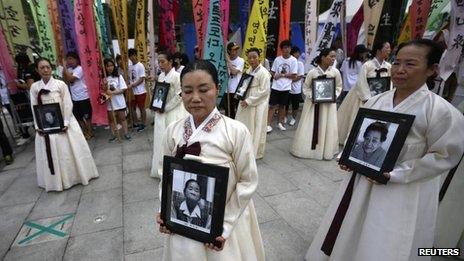Japan NHK boss Momii sparks WWII 'comfort women' row
- Published

Protests against Japan's wartime use of "comfort women" have taken place repeatedly in South Korea (pictured) and other Asian nations
The new head of Japan's national broadcaster NHK has caused controversy by playing down the military's use of sex slaves - so-called "comfort women" - during World War Two.
Days after taking up his new job, Katsuto Momii said the practice was common in any country at war.
He also said NHK should support the Japanese government in its territorial dispute with China.
As a publicly funded broadcaster, NHK is supposed to be politically neutral.
The BBC's Rupert Wingfield-Hayes, in Tokyo, says it was a shock when its new chairman started expressing such political views at his very first news conference.
'Puzzling'
Up to 200,000 comfort women are estimated to have been forced to work in Japan's military brothels in World War Two, most of them Korean.
Women from China, Taiwan, the Philippines and Indonesia were also conscripted.
Mr Momii said "such women could be found in any nation that was at war, including France and Germany".
He described international anger as "puzzling".
Japan's treatment of its wartime role has been a frequent source of tension with its neighbours,
Asked about the bitter dispute between Japan and China over islands in the East China Sea, Mr Momii said it "would not do for NHK to say left when the government says right".
Mr Momii is a businessman with no previous broadcast experience.
Insiders at NHK say his appointment was an attempt by the government of Prime Minister Shinzo Abe to bring the national broadcaster to heel, our correspondent reports.
If so, it appears to have backfired rather badly, he adds.
Mr Momii also said Japan's new state secrecy law was nothing to worry about.
- Published29 May 2013
- Published14 May 2013
- Published27 June 2013
- Published26 December 2013